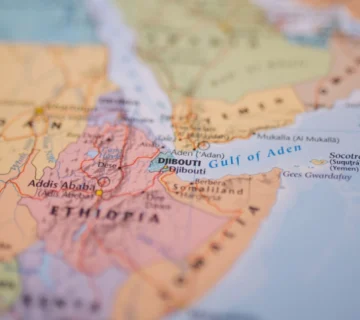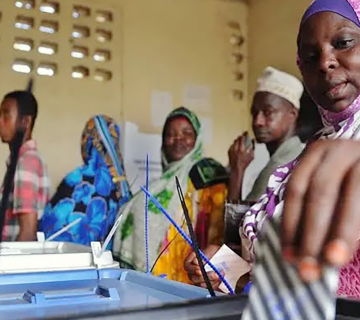The East and Horn of Africa region is under a wave of geopolitical changes. Even though they are challenging to regional peace and security, they present important opportunities for Kenya to astutely restore its traditional dominance and assert its national interest. Kenya should reshape its regional foreign policy to effectively respond to the current regional strategic environment in the wake of a political transition in Tanzania, armed conflict in Ethiopia, political stalemate in Somalia, applications by Democratic Republic of Congo and Somalia to join East African Community, and delicate peace and transition in South Sudan and Sudan respectively. The region’s main peace and security mechanisms, the Intergovernmental Authority on Development (IGAD) and the East African Community (EAC), are similarly trapped in bilateral tensions, conflicts, and political crises.
Of the region’s anchor states, Kenya still stands as the most politically stable and the most economically vibrant as the largest economy in Eastern Africa. In fact, had it not been for COVID-19 pandemic, the World Bank in January 2020 had estimated that Kenya would be Africa’s fastest-growing economy in 2021. On another front, Kenya’s governance, human rights, democratic and international credentials remain above her peers in the region. Kenya has now joined the United Nations Security Council for 2021-2022 tenure, while President Uhuru Kenyatta was elected in February 2021 the EAC Chairman and a Kenyan, Dr. Peter Mutuku Mathuki, has been appointed EAC Secretary-General for a five-year non-renewable term. Kenya’s regional policy should thus focus on the following components:
Improving Bilateral Relations
Bilateral relations between Kenya and several regional countries are either lukewarm, loose or tense. While Nairobi has maintained close relations with South Sudan, Uganda, Rwanda, and Ethiopia, these relations need a reset to further deepen Kenya’s regional influence and secure her national interests. Relations with Tanzania and Somalia have been episodically rocky, especially under former Tanzania’s president John Magufuli; and since the maritime case by Somalia against Kenya was taken to the International Court of Justice (ICJ) in 2014. Frosty relations with immediate neighbors Tanzania and Somalia risk Kenya’s national security and geo-economic interests, having already inspired a competition of ports and rails between Kenya and Tanzania; as well as frustrating security cooperation against al Shabab in Somalia. A change of policy is thus necessary to take advantage of Tanzania’s transition to reset to meaningful and stable relations, and the current security and political challenges in Somalia to forge beneficial relations which open a world of unlimited possibilities.
The East African Community (EAC)
With the Kenyan President serving as EAC chairman; a Kenyan Cabinet Secretary Adan Mohamed as the Chair of the Council of Ministers; other Kenyans as its Executive Secretary; and Chair of the Coordinating Committee, Kenya has a unique opportunity to effectively exert influence and drive regional integration in East Africa by facilitating the admission of Somalia and Democratic Republic of Congo whose applications have been pending. While Tanzania’s commitment and participation in the EAC have been imperceptible during President Magufuli’s reign, the new administration in Dodoma should be actively persuaded to be fully behind EAC affairs. However, other EAC member states similarly share tense relations especially Rwanda and Burundi, Uganda and Rwanda, and to some extent, Rwanda and Tanzania. Kenya has its task cut out to stabilize the region and expedite regional integration by, for instance, improving bilateral relations within its membership.
The Intergovernmental Authority on Development (IGAD)
The IGAD presents another important geopolitical instrument in the Horn of Africa despite internal challenges. The post of Executive Secretary is occupied by Ethiopia while the Chairperson’s post is occupied by Sudan’s Prime Minister. However, Sudan and Ethiopia are currently embroiled in an armed border conflict, while Ethiopia is further trapped in a domestic armed conflict in its northern region of Tigray which has further destabilized the country politically and created an internationally alarming humanitarian disaster. Sudan is further pre-occupied with a delicate transition under a power-sharing arrangement with the country’s military and paramilitary formations since the toppling of its former leader, Omar al Bashir. South Sudan, a former close ally of Kenya, has its stability hanging on the balance of a delicate peace agreement and inter-ethnic conflict. Somalia on the other hand, is deep in the throes of electoral, constitutional and political crisis following a failed election which triggered government “illegitimacy” and “aggressive” opposition amid a worsening militant insurgency by al Shabab. As an anchor state, Kenya should effectively assert its role in IGAD and summon its UN Security Council stature to steer regional stability and peace, and save IGAD from further internal polarization.
Economic Interests
Kenya’s national and regional economic ambitions can be secured through expansion of trade, leveraging its transport and logistics infrastructure, tourism, and competitive domestic market and economy. However, these will significantly depend on achievement of regional peace, stability and larger regional integration. The opportunity to steer the EAC processes and refocus IGAD on peace and security, for greater peace and integration (especially common market), strategically boosts Kenya’s national interest as well as regional economic and commercial prospects.
Kenya should quickly analyze its immediate strategic environment, establish the opportunities and challenges to its current regional policy, and adopt a new policy posture which maximizes its regional influence, national interest and geo-strategic leverage. Consideration of the existing regional competition for political, economic and commercial dominance, will further make Kenya’s new policy as creative, innovative, competitive and assertive as possible for the long-term.
Edmond J. Pamba is a Researcher at HORN Institute.
Photo: East African Flags at the East African Legislative Assembly in Tanzania (Photo Credit: EAC)



